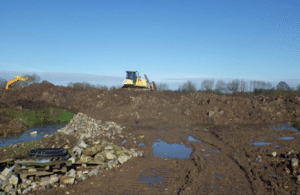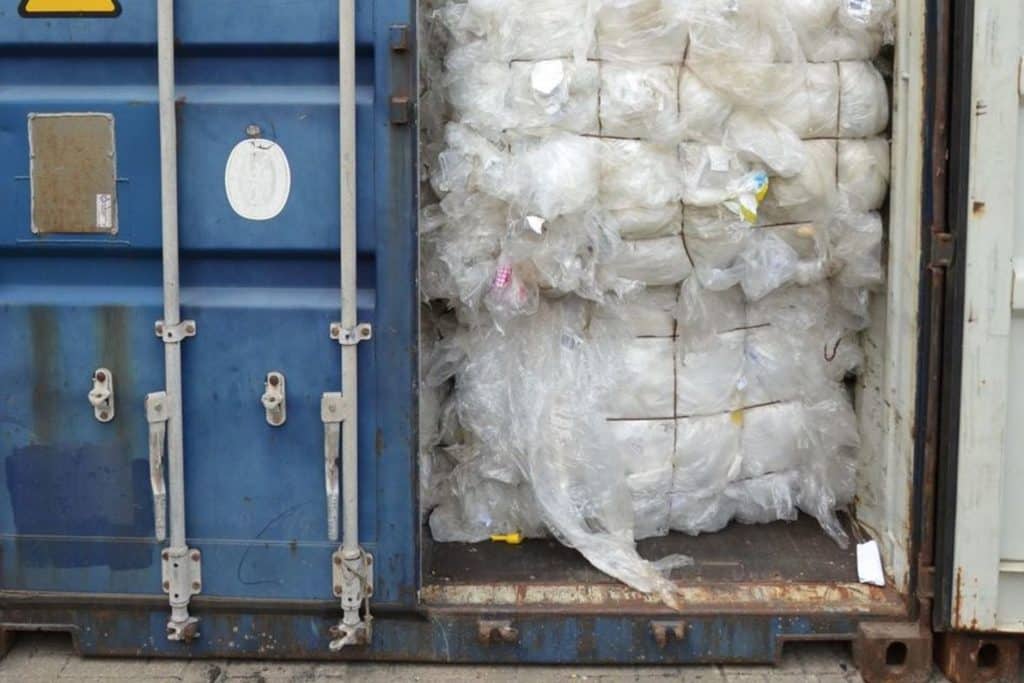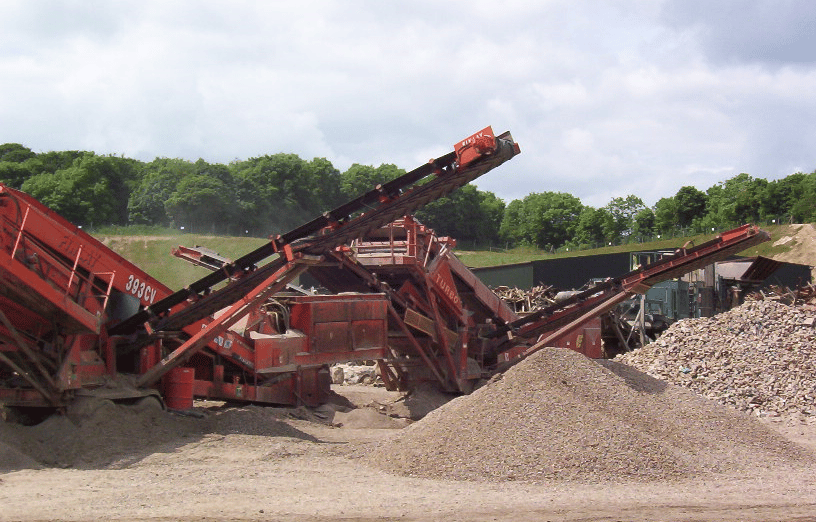Multiple people involved in large scale illegal waste crime in Staffordshire are facing prison following a successful prosecution by the Environment Agency.
The sentencing, which led to the conviction of 5 of the defendants, took place on 2 April 2024, at Shrewsbury Crown Court sitting at Telford Magistrates, following an 8-week trial in September and October 2023.
The prosecution concerned a large-scale illegal dumping of waste at Bonnie Braes Farm in Staffordshire, with offences taking place between 1 March 2014 and 30 June 2015.
At least 100,000 tonnes of waste was brought onto the site during the charge period, when there was no legal right to do so. This activity included a significant amount waste from excavation, alongside other mixed refuse and some asbestos.
The volume of waste added to the site meant that the land was raised by 6 – 7 metres in height. Additional concern was created by the crucial gas distribution pipeline which passes underneath Bonnie Braes Farm, one of two that supplies Stoke-on-Trent. A fracture of the pipeline would have had devastating consequences, causing disruption to the supply of gas as well as the potential closure of the busy A500 road for a significant period.
Mr Recorder Nicholls, found that the offending caused Category 1 harm to the environment due to the eyesore that the deposits caused. In considering the large scale illegal waste crime in Staffordshire, he stated the impact that the weight had on the site, created negative effects not only to the gas pipeline but also to a culvert on the site, which was found to have collapsed, causing significant flooding to the land in heavy rain. The operation of the site also caused significant disruption on lanes that were unsuitable for large vehicles and the tracking of mud from the site across the roads.

We are glad to see the outcome of these prosecutions and will continue to work tirelessly to tackle environmental crime. Illegal waste sites like this, undermine legitimate businesses, undercut their prices, and blight the environment. We would urge everyone to check that a waste site is licenced before using them by checking the public register online at GOV.UK. If people suspect criminal activity, they should report it to our 24-hour incident hotline 0800 807060 or anonymously through CrimeStoppers on 0800 555111.
Environment Agency Spokesperson
Large Scale Illegal Waste Crime Sentences
Mr Recorder Nicholls imposed the sentences as follows:
Raymond Bowden,64 of Liverpool Road, Church Lawton, was sentenced to 30 months immediate custody. He was also disqualified from holding the position of a director for a period of 8 years and 3 months. A Proceeds of Crime Application is outstanding and will be determined at a future date.
Joe Frizell, 48 of Crewe Road, Shavington, was sentenced to 2 years immediate custody. He was also disqualified from holding the position of a director for a period of 6 years. A Proceeds of Crime Application is outstanding and will be determined at a future date.
James Bowden, 44 of Bignall Hill, Bignall End was sentenced to 15 months imprisonment that was immediately suspended for 18 months. He must undertake 240 hours of unpaid work. He was also disqualified from holding the position of a director for a period of 5 years. A Proceeds of Crime Application is outstanding and will be determined at a future date.
Victoria Webb-Johnson, 47 of Sydney Road, Crewe was sentenced to 10 weeks imprisonment suspended for 12 months. She was also ordered to pay a contribution towards the costs of the prosecution of £8000 and the victim surcharge.
Stefan Paraszko, 66 of High Street Silverdale, was sentenced to 11 months imprisonment that was immediately suspended for 18 months and the victim surcharge.
VWJ Earth Moving Limited was fined £11,000 and ordered to pay a contribution towards the costs of the prosecution of £8000 and the victim surcharge
Jumbo Waste and Metal Limited was fined £1, as the company is in liquidation, and the victim surcharge.
TW Frizell (Haulage & Plant Hire) Ltd was fined £1, as the company is in liquidation, and the victim surcharge.
Joe Frizell was also sentenced alongside RJC Regeneration Limited in respect of a matter that occurred at Elms Farm, Betley, Crewe. In that case waste was deposited without the benefit of an Environmental Permit and exceeded the allowances of any waste exemptions.
In respect of the Elms Farm case, Mr Recorder Nicholls imposed the following sentences:
Joe Frizell was sentenced to 2 months immediate custody to run concurrently with his other sentence – this means he received a total of 2 years immediate custody overall.
RJC Regeneration Limited was fined £8000 and the victim surcharge
Further information
In the matter large scale illegal waste crime in Staffordshire from Chester Crown Court, Joe Frizell, RJC Regeneration Ltd and Mark Oulton pleaded guilty on 18 July 2023 to offences relating to the depositing of illegal waste at Doddlespool Farm and Elms Farm, Crewe at Chester Crown Court on 18 July 2023.
Mark Oulton, 53 of Main Road, Betley, was sentenced by Chester Crown Court on 8 September 2023 to 9 months custody suspended for 18 months. In addition, he was sentenced to 130 hours unpaid work, a £5000 fine and ordered to pay a contribution towards the prosecution costs of £27,000. Mr Oulton was also made subject to a court order requiring him to remove waste illegally deposited and stored on Doddlespool Farm by 8 September 2024.
Large Scale Illegal Waste Crime Charges
Jumbo Waste & Metals Ltd
Jumbo Waste & Metals Ltd did between the 1st March 2014 and the 30th June 2015, contravened regulation 12(1) of the Environmental Permitting (England and Wales) Regulations 2010 operate a regulated facility on land known as Bonnie Braes Farm, Bignall End, without the authorisation of an environmental permit, contrary to Regulation 38(1)(a) of the Environmental Permitting (England and Wales) Regulations 2010.
Raymond Bowden
Raymond Bowden did between the 1st March 2014 and the 30th June 2015, contravened regulation 12(1) of the Environmental Permitting (England and Wales) Regulations 2010 operate a regulated facility on land known as Bonnie Braes Farm, Bignall End, without the authorisation of an environmental permit, contrary to Regulation 38(1)(a) of the Environmental Permitting (England and Wales) Regulations 2010.
James Bowden
Between the 12th January 2015 and the 30th June 2015, Jumbo Waste & Metals Ltd contravened regulation 12 of the Environmental Permitting (England and Wales) Regulations 2010 by operating a regulated facility at Bonnie Braes Farm, Bignall End outside the terms of authorisation of an environmental permit and this offence was committed with the consent or connivance or was attributable to the neglect of James Bowden, being a director of the said company, contrary to Regulation 38(1) and Regulation 41(1) of the Environmental Permitting (England and Wales) Regulations 2010.
Stefan Paraszko
Stefan Paraszko pleaded guilty to between the 1st March 2014 and the 30th June 2015, contravened regulation 12(1) of the Environmental Permitting (England and Wales) Regulations 2010 operating a regulated facility on land known as Bonnie Braes Farm, Bignall End, without the authorisation of an environmental permit, contrary to Regulation 38(1)(a) of the Environmental Permitting (England and Wales) Regulations 2010.
TW Frizell (Haulage & Plant Hire) Ltd
TW Frizell (Haulage & Plant Hire) Ltd, between the 1st March 2014 and the 30th June 2015, deposited controlled waste on land at Bonnie Braes Farm, Bignall End when there was no environmental permit in force authorising the deposits, contrary to sections 33(1)(a) and 33(6) of the Environmental Protection Act 1990.
Joe Frizell
Between the 1st March 2014 and the 30th June 2015, TW Frizell (Haulage & Plant Hire) Ltd deposited controlled waste on land at Bonnie Braes Farm, Bignall End when there was no environmental permit in force authorising the deposits and this offence was committed with the consent or connivance or was attributable to the neglect of Joe Frizell, being a director of the said company, contrary to sections 33(1)(a), 33(6) and 157(1) of the Environmental Protection Act 1990.
VWJ Earthmoving Ltd
VWJ Earthmoving Ltd pleaded guilty to between the 1st March 2014 and the 30th June 2015, depositing controlled waste on land at Bonnie Braes Farm, Bignall End when there was no environmental permit in force authorising the deposits, contrary to sections 33(1)(a) and 33(6) of the Environmental Protection Act 1990.
Victoria Webb-Johnson
Victoria Webb-Johnson pleaded guilty to between the 1st March 2014 and the 30th June 2015, VWJ Earthmoving Ltd deposited controlled waste on land at Bonnie Braes Farm, Bignall End when there was no environmental permit in force authorising the deposits and this offence was committed with the consent or connivance or was attributable to the neglect of Victoria Webb-Johnson, being the director of the said company, contrary to sections 33(1)(a), 33(6) and 157(1) of the Environmental Protection Act 1990.
Chester Court Charges
Mark Oulton
Between 16 February 2018 to 22 March 2021 at Doddlespool Farm, Main Road, Betley, Crewe, CW3 9AE, Mark Oulton did operate a regulated facility, namely a waste operation for storage of waste, except under and to the extent authorised by an environmental permit, contrary to Regulations 12 and 38(1)(a) of the Environmental Permitting (England and Wales) Regulations 2016.
Between 3 October 2017 to 22 March 2021 at Elms Farm, Betley Road, Betley, Crewe, Mark Oulton did operate a regulated facility, namely a waste operation for storage of waste, except under and to the extent authorised by an environmental permit, contrary to Regulations 12 and 38(1)(a) of the Environmental Permitting (England and Wales) Regulations 2016.
RJC Regeneration Ltd
Between 3 October 2017 to 23 March 2018 at Elms Farm, Betley Road, Betley, Crewe, RJC Regeneration Ltd did deposit waste on land without the benefit of an environmental permit contrary to Section 33(1)(a) of the Environmental Protection Act 1990.
Joe Frizell
Between 3 October 2017 to 23 March 2018 at Elms Farm, Betley Road, Betley, Crewe, RJC Regeneration Ltd did deposit waste on land without the benefit of an environmental permit and that offence was committed with the consent, connivance or was attributable to the neglect of Joe Frizell contrary to Sections 33(1)(a) and 157 of the Environmental Protection Act 1990.
If you require advice on environmental permits or waste exemptions, please contact one of the Ashbrooke team.


